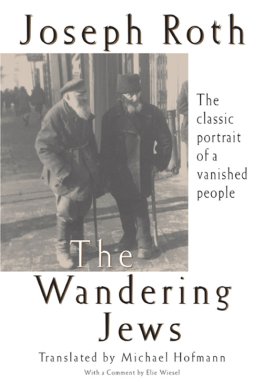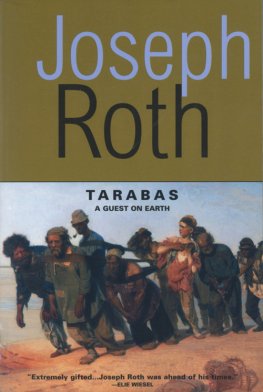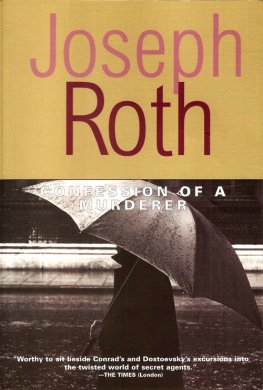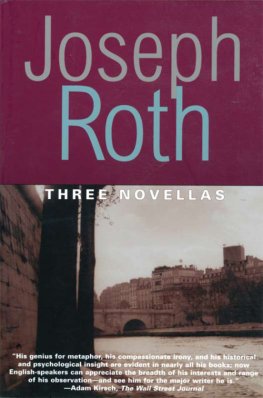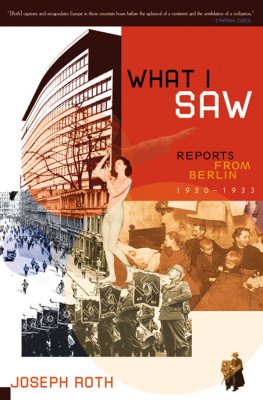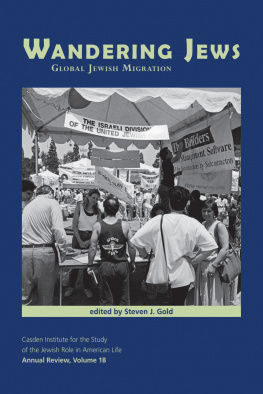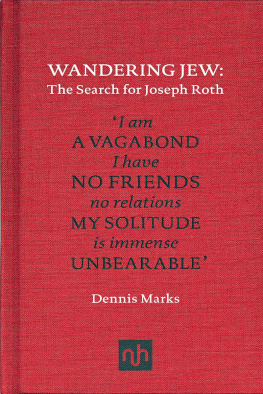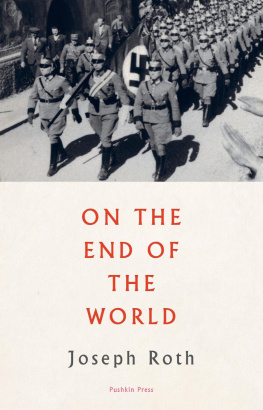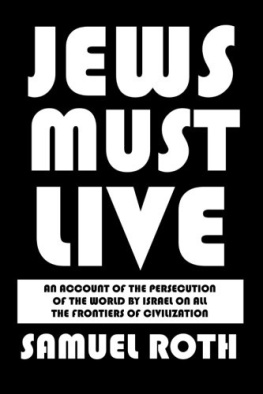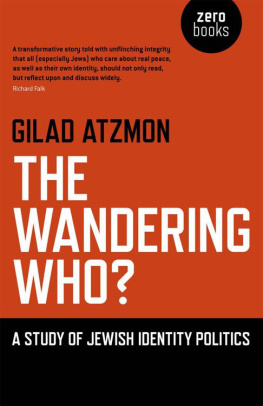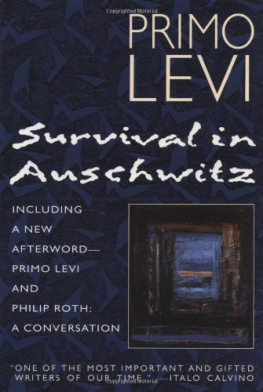Joseph Roth
The Wandering Jews
p. iv
The author on a train platform during a trip to Frank furt, 1926.
p. x
The faithful leaving the Altstadt Synagogue on Wolborska Street, Lodz.
p. xxii
Portrait of the author, c. 1920s.
p. 4
A courtyard in Berlin, 1927.
p. 24
In the ghetto of Vilnius, Poland (today Lithu ania), 1939.
p. 54
Rue de Tournon, looking south to the Palace of Luxombourg, 1938.
p. 92
Two Jewish men on a boat in New York, n.d.
p. 104
Pushkin Street, Odessa, Soviet Union (today Ukraine), 1916.
p. 116
Two men, Dubno, 1938.
p. 120
Dubno, 1938.

A COMMENT BY ELIE WIESEL
The Wandering Jews is a masterful work by Joseph Roth, a truly extraordinary writer. To read this work is to become its messenger. In these disturbing yet strikingly illuminating pages, the truth of a Jewish destiny from long ago vibrates and sings as though awakening the memory of enlightened wanderers. Everything is here: the love of an engulfed Jewish world, beautiful and moving; the passion for the wisdom of its inhabitants; the quest of the sacred by its brothers and sisters seeking a bright spot, a little peace, and, above all, the burning words that endure while all else has vanished into the madness and despair of mankind.
TRANSLATORS PREFACE TO The Wandering Jews
The Wandering Jews shows a side of Joseph Roth that has not yet been seen in English: the essayist, the analyst of contemporary life, the marshaler of arguments (and to a lesser degree, of facts and figures), the rhetorician, the pas sionate, orderly, and mobile argufier. Admirers of Roths fiction may be surprised at the brilliance and forcefulness of the intellect at work here I know I was. The distinguished German critic Walter Jens describedThe Wandering Jews as the best book on its subject in German. I am astonished that, in three-quarters of a century, there seems, until now, to have been no English translation of it.
This short book emerges quite straightforwardly from Roths professional interests and preoccupations and a little more clandestinely from his personal background and experience. The interests first: In the early 1920s, as a young journalist in Vienna and then in Berlin, Roth wrote numerous articles drawing attention to the awful plight of refugees and displaced persons Jews and others in the aftermath of World War One, the Russian Revolution, and the redrawing of national frontiers fol low ing the Treaty of Versailles (1919). Hundreds of thou sands of people those lucky ones who hadnt been butchered already found themselves unhoused and persecuted, with no option but to take to the road. They sought shelter in cities and towns where most of them had never been and, unfortunately, where they were made despicably unwelcome. Roth spent a great deal of time visiting their refuges and encampments and ghettoes; he also visited their homelands. In the last five months of 1926, he toured the Soviet Union, where he wrote the final section, The Condition of the Jews in Soviet Russia. The Wandering Jews was a timely and important book, one that Roth was supremely well qualified to write. That he was aware of this himself is shown by occasional outbreaks of anxiety and statistics (both very unusual in this writer). The Wandering Jews counters the campaigns of fear and disinformation that were mounted by the authorities and media. It shows Roths lifelong sympathies with simple people, the dispossessed guests on this earth (sub titles of two of his novels), and his antipathy to a selfish, materialistic, and increasingly homogeneous bourgeoisie. It is no accident, I think, that The Wandering Jews begins with a proud and rancorous castigation of that West, which Roth wants no part of: a reverse dedication.
Historically, the survival of the Jews in Europe to that point was largely a matter of happenstance, or, at the most, of enlightened self-interest on the part of whatever country was next prepared to take them in. As one door closed, another haltingly, opportunely, perhaps opened. The slightest delay of course spelled instant crisis and tragedy. Roth sensed that the Twenties were such a time of crisis, and that the countries of Europe and beyond (the land of unlimited opportunity by which of course I mean not America but Germany), stumbling out of one war and into another, floored by inflation, willing victims of atro cious right-wing propaganda and nationalist rhetoric, would not be hospitable to the Jews who were being turned out of the East. Roths anger in the opening pages of this book suggests that he already sensed there was little to be hoped for from or, ten years later, forthe assimilated Jews in Germany, and that the Jews, always living more securely in time than space, would soon be banished to it altogether.
The Wandering Jews does two things: It describes, as Roth says, the human beings who constitute the Jewish problem, and it casts about for a solution to that problem. In the first, it succeeds magnificently. Roth organizes his proteanly diverse subjects, and extends, it seems almost to every one of them, a unique sympathy and warmth. (The only exception being the middle-class, assimilated, denying Jews in the West.) The book is crammed with adoring portraits and analyses it is an adoring analysis of individuals and groups that are not merely heterogeneous but almost incompatible. The Jews, it seems to me, are to Roth human beings in their least packaged form. Fissured by history and geography, religiosity and class, ideology and national affiliation, mutual prejudice and the degree of their integration in their respective countries, they are the most anomalous, individual of peoples. And the more improbable, the more Roth loves them: the burly dockworker in Odessa, the elegant Parisiennes, the musical clown from Radziwillow, the young builders of Palestine, the wonder-rabbis front of house man, so bewilderingly up on world affairs, and given such a glowing Noldean portrait.
So far as offering solutions to the problem, that is a different matter. For all the admiration and sympathy advanced to all the various individuals and groups, its not easy to think of one that is endorsed as the way forward: not Zionism, not ever-Westward migration, not the social experiment of the Soviet Union, and, least of all, not the abandonment of Jewishness. And yet, as Roth must have realized, the Jewish shtetl can hardly still have existed in 1926. The optimistic section on Paris frays into smaller notes on other places and ends with the desperate jab at humanism. Even the wonderfully droll, actually rather Kafkaesque chapter on America ends with the Jew still excluded, still staring at Liberty through prison bars. It seems then that Roth moves Zeno-ishly between a past that is already over and a future that never eventuates. What is left for Roth and this is not a solution at all is the destiny of the wanderer (no home anywhere, but their graves may be found in every cemetery). In short The Wandering Jews describes a problem that is not really a problem at all more a blessing and to which there is no solution. As one reads the 1937 Preface, one senses that all Roth is able to hope for and this is simultaneously a cause of his greatest despair is conditions for Jews getting steadily and bearably worse. What happened instead was the Holocaust.
I used the word clandestinely a while ago, and some readers may wonder: Where in all this is Joseph Roth? The answer is everywhere and nowhere, chiefly nowhere. We see him and feel him as an investigator, a roving reporter, a trustworthy and opinionated guide but the book rigorously excludes anything avowedly personal. We dont know that the little cruciform town in the swampy plains (described here for the first time, though it will appear later in

